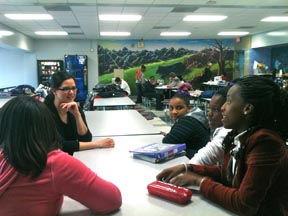Whenever the sound of thunder rumbles through Birmingham’s Pratt City, many students at Daniel Payne Middle School say they become tense. Nearly a year after a tornado ripped through their community on April 27, they still have emotional scars.

When University of Alabama at Birmingham media studies students heard about these youngsters, they set out to give a voice to the tales of fear, triumph and reticent hope that were locked inside.
Film students Elisabeth Chramer, Jessica Craig, Rebecca Kennerly, Kathleen McAlister, Doctorre McDade, Danielle Rand and Amber Taylor partnered with Daniel Payne’s afterschool program and taught the sixth through eighth graders the basics of filmmaking and allowed them to share their stories on camera.
“They talked very frankly about their hopes and fears for the rebuilding effort in their community,” says Michele Forman, co-director of the media studies program. “They are afraid that their community as they knew it may be gone forever. They fear that the people who left will not come back.”
On April 21, 2012, their digital stories will debut at the McWane Science Center, 200 19th St. North, in an exhibition to commemorate the anniversary of the storm. Their film will be one of seven UAB student-produced films projected onto a Science on a Sphere with a six-foot diameter. Other stories feature the history of Pratt City, the role animals played in alerting owners of the storm, disaster-preparedness efforts, the work of a microloan program run by the UAB School of Business students and more.
“It is a humbling experience to help the Daniel Payne students tell their story,” says McDade, a 33-year-old senior majoring in philosophy and minoring in media studies. “They just want their story told so that they can get the relief they need to move on.”
The youngsters were asked to bring in artifacts from the storm and when they began to talk about them, the floodgates opened, he says.
One student brought in a worn candle and talked about living in darkness from power outages that seemed to stretch into eternity. Another student brought an old glove that his mother used to cook food on a makeshift stove. She fed her family and others in the community using a propane heater.
A young boy brought in a twisted light fixture. It once hung from the wall at his community church. He talked about how it hurts that he can no longer sit in its pews.
One girl brought the outfit she wore the day the storm hit. She can no longer put it on, she said; the memories are too raw.
Another girl began to tell her story but started to shake.
“She couldn’t even finish,” McDade says.
The outcome was surprising. The young students began to think beyond Pratt City, McDade says, even expressing an interest in attending college.
“A lot of them are talking about going into film or drama or acting,” he says, noting that many didn’t know they could attend college and major in anything other than medicine or law.
“They were very excited about us taking an interest in them,” McDade says of the students. “Before this project, the students thought that people had forgotten all about them. Now they know that people care.”